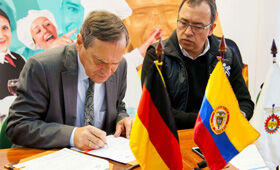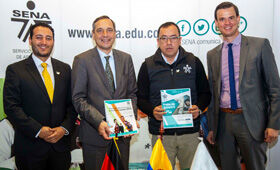Vocational education and training cooperation with Columbia extended for four more years
New cooperation agreement signed between BIBB and the Columbian National Service for Vocational Education (SENA) in Bogotá
The aim is that the new cooperation agreement will act as a basis for the firm establishment of the Columbian dual training model in legal and institutional terms with the help of consultancy services from BIBB. One important foundation in this regard is the “2015-2018 SENA Strategic Plan”, which seeks to bring about the further development and institutionalisation of the Columbian dual training model by 2018, as well as to embed it at a national level.
The Federal Institute for Vocational Education and Training (BIBB) and the Columbian National Service for Vocational Education (SENA) have been working together on the basis of a cooperation agreement since as long ago as 2011, mainly in the field of VET research. On 26 October 2016, a new four-year cooperation agreement was signed in Bogotá by the Director of SENA, Alfonso Prada, and Professor Reinhold Weiß, Deputy President and Director of Research at BIBB.
The signing of the agreement took place in the presence of a number of high-ranking Columbian politicians and representatives of trade and industry. Also in attendance were specialists and management staff from SENA and delegations from the German-Columbian Chamber of Commerce and Industry and the German embassy in Bogotá. Trainees and company representatives from “AVIANCA”, Columbia’s largest airline, and from the major Columbian company “Colmotores General Motors”, which is currently involved in the dual training offered by SENA, also participated in the signing ceremony.
The main focuses of cooperation over the next four years are as follows:
- Support in the establishment of a legal framework for Columbian dual Training;
- Establishment of a monitoring system for VET reporting, including the documentation of effects;
- Vocational education and training research into early recognition of skills developments and new qualifications requirements on the labour market for the purpose of using these for regulatory work;
- Basic methodological principles for the analysis of occupational integration and employment (research methods for the analysis of labour market trends).
As part of the signing ceremony, the first Columbian National Data Report on Vocational Education and Training was also presented. This was prepared with the aid of consultancy services provided by BIBB. In his speech, Professor Weiß emphasised that, in establishing research competences and introducing dual training, SENA had taken an important step towards further strengthening the quality and attractiveness of the Columbian vocational education and training system. Within this context, he added that “the involvement of all relevant stakeholders in Columbian VET is an important element of qualified VET”. This is an area in which BIBB is seeking to provide ongoing assistance to SENA and to support the latter in its endeavours to introduce and further develop dual training in Columbia.
Eight companies are currently participating in the SENA dual training model (based on the German system). 937 dual trainees are registered at present, and 508 apprentices have previously successfully completed dual training. 60% of these found work directly upon conclusion of training.
Background
The objects of previous cooperation have been the establishment of research competences within SENA and the introduction of dual training based on the German model. For this purpose, a research centre was set up at SENA by decree in 2012. Alongside study visits to Germany, conducted with the aim of attaining greater familiarity with the dual training model and its various stakeholders, numerous workshops have been staged on VET reporting, on the costs and benefits of company-based training, and on the legal framework governing vocational education and training in Columbia and Germany. In 2016, BIBB and SENA jointly conducted a case study on the motivation and organisation of companies in VET in the automobile sector. In addition, BIBB is supporting SENA in the development of a concept for and the pilot implementation of dual vocational education and training in the automobile, food and textile industries and, since this year, in the aviation sector.
Summary of the main characteristics of SENA dual training
- Two learning venues – the SENA Vocational Education and Training Centre (a vocational school and inter-company vocational training centre rolled into one) and the company providing training
- A training contract stipulates the general conditions for training
- A rotation plan for the rotation of cooperation between learning venues is in place and is drawn up by the vocational school teacher and trainer at the company
- Duration of training is (depending on the qualification level) 6, 12 or 15 months (the plan is that training programmes of 24 months will be introduced in the next phases of the piloting of dual training)
- Trainer qualification takes place via an 80-hour SENA training course which is mandatory for every company offering training


